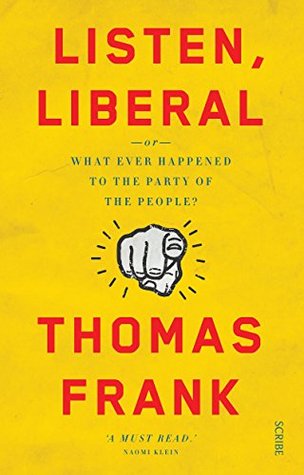More on this book
Community
Kindle Notes & Highlights
by
Thomas Frank
Read between
September 7 - September 7, 2017
From the middle of the Great Depression up to 1980, the lower 90 percent of the population, a group we might call “the American people,” took home some 70 percent of the growth in the country’s income. Look at the same numbers beginning in 1997—from the beginning of the New Economy boom to the present—and you find that this same group, the American people, pocketed none of America’s income growth at all. Their share of the good times was zero. The gains they harvested after all their hard work were nil.
In 2014, according to a much-discussed think tank report, the total of all the bonuses handed out on Wall Street was more than twice as much as the total earned by every person in the country who worked full-time for the minimum wage.5
To say “the center held,” as one of his biographers does, is an optimistic way to describe Barack Obama’s accomplishment.6 Another would be to say he saved a bankrupt system that by all rights should have met its end.
Democrats now know with the certainty of political science itself that those Republican advances will slowly but surely be reversed. Democrats no longer need to plead, explain, or persuade; henceforth they need merely to wait.
Today we live in a world of predatory bankers, predatory educators, even predatory health care providers, all of them out for themselves.
When the left party in a system severs its bonds to working people—when it dedicates itself to the concerns of a particular slice of high-achieving affluent people—issues of work and income inequality will inevitably fade from its list of concerns.
What this doctrine means for the politics of income inequality should be clear: a profound complacency. For successful professionals, meritocracy is a beautifully self-serving doctrine, entitling them to all manner of rewards and status, because they are smarter than other people. For people on the receiving end of inequality—for those who have just lost their home, for example, or who are having trouble surviving on the minimum wage, the implications of meritocracy are equally unambiguous. To them this ideology says: forget it. You have no one to blame for your problems but yourself.
The professional class is defined by its educational attainment, and every time they tell the country that what it needs is more schooling, they are saying: Inequality is not a failure of the system; it is a failure of you.
Although the professions are thought to represent the pinnacle of human brilliance, what they are actually brilliant at is defending and applying a given philosophy.
Despite the favorite Sixties slogan, professionals do not question authority; their job is to apply it.
“I know what Dan Quayle means when he says it’s best for children to have two parents,” Miller thundered at one point. “You bet it is! And it would good if they all had trust funds, too!”
It’s a line Clinton repeated a number of times in the course of his years in government,* and here, in a single sentence, is the distilled essence of the theory that has governed the politics of work and compensation from that day to this: You get what you deserve, and what you deserve is defined by how you did in school.
But it doesn’t take an advanced degree to figure out that this education talk is less a strategy for mitigating inequality than it is a way of rationalizing it.
“What were we saying to the country, to our young people, when we lowered capital gains taxes and raised taxes on those who earned their living by working?,” asked Joseph Stiglitz: “That it is far better to make your living by speculation than by any other means.”
CAPTIVE NATION A few years ago, I read an article claiming that the United States is the first society ever to record more rapes of men than of women, a distinction attributable to the vast numbers of men we have seen fit to imprison.6 Another disturbing fact: According to the legal scholar Michelle Alexander, author of The New Jim Crow, there are now more black adults in some kind of “correctional control”—meaning under the restraint of some arm of the criminal justice system—than there were slaves in 1850.
Welfare reform is almost always spoken of these days as a policy triumph, usually because of the single data point that there are fewer people now who collect welfare than there were before the law went into effect. This reasoning has always perplexed me: Of course fewer people are going to use a program if you cut the number of people allowed to use it.
Instead, his New New Deal merely sent money to others; on its own it built no tunnels in national parks, constructed no Art Deco county courthouses, painted no murals on post office walls, published no guidebooks to the states. As a result, it missed out on another achievement of the Roosevelt era: the creation of spectacular and unmistakable monuments to activist government.
Reform often comes from the margins of American life, but marginal is not a term anyone would use to describe the satisfied, conventionally minded people of the Obama administration. This team was limited by its excellence, restrained by its orthodoxy.
Monopoly is what makes innovation possible; take it away and the genius factory will close down.


